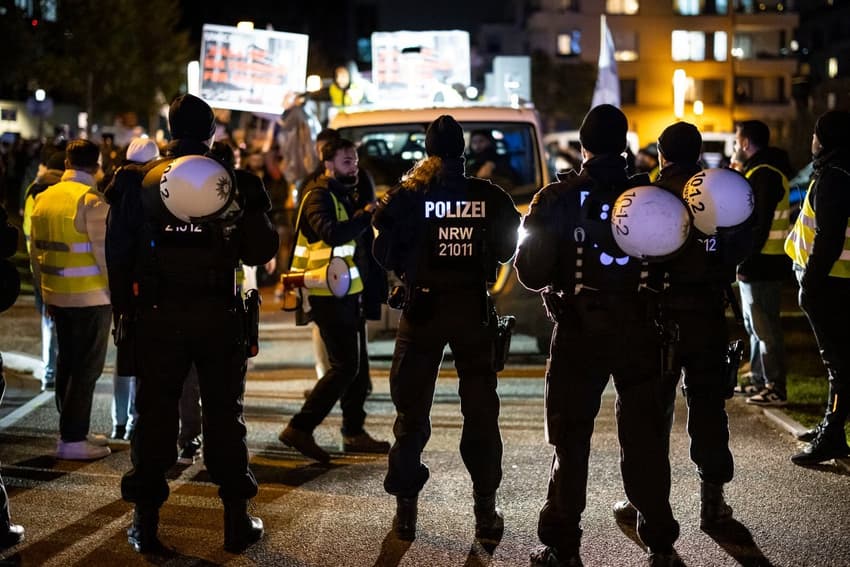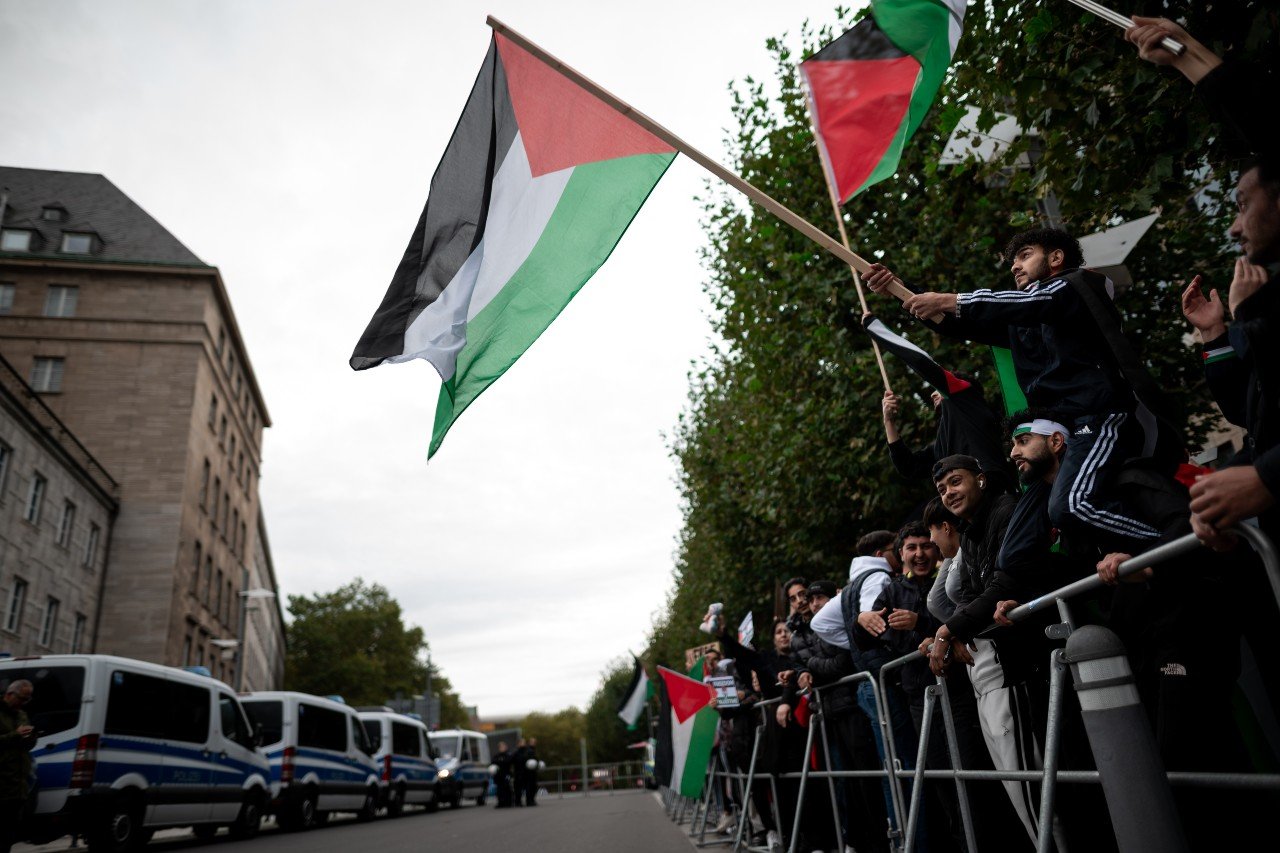Why has Germany dropped down the rankings in freedom of expression?

According to a report by the NGO Civicus, Germany is no longer an "open" country and freedom of expression has "narrowed" due to excessive crackdowns on climate and pro-Palestinian protesters.
For many years Germany was considered one of the top countries in the world in the annual Monitor by NGO Civicus and categorised as one of the world’s few “open” countries, but amid a wave of prosecutions against pro-Palestinian and climate protesters, the country’s ranking has dropped down to “narrowed.”
Germany was just one of two countries in Europe to be downgraded, alongside Bosnia and Herzegovina, dropping from 84 to 76 points in the freedom ranking, which looks at freedom of expression and assembly.
“We have identified and documented some concerning trends in Germany which are also present in the entire EU and even wider: a very repressive and disproportionate response to the mass mobilisation of climate groups and civil society organisations, which we’ve seen across the year," Tara Petrovic, Civicus lead researcher for Europe and Central Asia, told The Local.
READ ALSO: German police carry out nationwide raids against climate activists
One other emerging trend in the report - which covers up to October 31st – is the restriction of protest in solidarity with Palestine.
The report states that “police used excessive force against pro-Palestinian protesters in a district of Berlin with a significant Arab population, including deploying pepper spray and water cannons and arresting 174 people” and that “authorities also banned pro-Palestinian protests in Berlin and Frankfurt, in line with similar bans in past years”, concluding that “such restrictions on the ability to gather and demonstrate are discriminatory in nature and violate the right to peaceful assembly.”
Petrovic pointed to “preventative or blanket bans on protest, which we’ve seen in multiple cities before this was struck down by a court” as “clear violations of the freedom of peaceful assembly.”
“This stands in contrast to freedom regardless of the context, with preventive protest bans and excessive force used by police”, she said, including the Nakbah day protests that were banned in advance by police in Berlin in May 2023.
PODCAST: Why is Germany coming down hard on Palestine solidarity protests?
As justification for pre-emptively banning demonstrations, German police have said they want to prevent expressions of anti-Semitism and have argued that such gatherings could pose a threat to the public order or incite violence by glorifying the October 7th attacks.
However, Petrovic said police have often overstepped the mark.
She gave the example of the arrest of a protester in Berlin’s Neukölln district for holding a sign saying “as an Israeli Jew I stand against genocide in Gaza”.

Demonstrators hold Palestine flags at a solidarity protest in Bochum as police vans line up across the street. Photo: picture alliance/dpa | Fabian Strauch
“This represents an overreach of police conduct represent regardless of perceptions of what Germany’s foreign policy stance towards Israel should be," Petrovic argued.
"Just using the term genocide without any discriminatory violence… does not contain messages that are outside the scope of polite expression"
The Global Findings report points to particular incidents like the raiding of the homes of 11 Last Generation activists in December 2022 and confiscation of their phones and laptops, as well as Munich public prosecutors office’s admission that they had engaged in surveillance of Last Generation’s communications, including with journalists.
“We see this as a disproportionate response,” Petrovic said.
These trends are taking place across the world, with the percentage of the world’s population living in “open” countries – the top category - having almost halved to just 2.1 percent since 2018 when Civicus began. Meanwhile, almost a third of the world’s population are living in the most restrictive civic spaces possible, a category which includes China and Saudi Arabia.
READ ALSO: Could Germany strip citizenship rights from foreigners over anti-Semitism?
So how does Civicus arrive at the decisions?
As well as in-house expertise, they rely on research by organisations like Freedom House or Reporters without Borders to draw up the ranking which looks at the three fundamental freedoms: expression, assembly and association.
“This isn’t an arbitrary decision,” Petrovic said.
Comments
See Also
For many years Germany was considered one of the top countries in the world in the annual Monitor by NGO Civicus and categorised as one of the world’s few “open” countries, but amid a wave of prosecutions against pro-Palestinian and climate protesters, the country’s ranking has dropped down to “narrowed.”
Germany was just one of two countries in Europe to be downgraded, alongside Bosnia and Herzegovina, dropping from 84 to 76 points in the freedom ranking, which looks at freedom of expression and assembly.
“We have identified and documented some concerning trends in Germany which are also present in the entire EU and even wider: a very repressive and disproportionate response to the mass mobilisation of climate groups and civil society organisations, which we’ve seen across the year," Tara Petrovic, Civicus lead researcher for Europe and Central Asia, told The Local.
READ ALSO: German police carry out nationwide raids against climate activists
One other emerging trend in the report - which covers up to October 31st – is the restriction of protest in solidarity with Palestine.
The report states that “police used excessive force against pro-Palestinian protesters in a district of Berlin with a significant Arab population, including deploying pepper spray and water cannons and arresting 174 people” and that “authorities also banned pro-Palestinian protests in Berlin and Frankfurt, in line with similar bans in past years”, concluding that “such restrictions on the ability to gather and demonstrate are discriminatory in nature and violate the right to peaceful assembly.”
Petrovic pointed to “preventative or blanket bans on protest, which we’ve seen in multiple cities before this was struck down by a court” as “clear violations of the freedom of peaceful assembly.”
“This stands in contrast to freedom regardless of the context, with preventive protest bans and excessive force used by police”, she said, including the Nakbah day protests that were banned in advance by police in Berlin in May 2023.
PODCAST: Why is Germany coming down hard on Palestine solidarity protests?
As justification for pre-emptively banning demonstrations, German police have said they want to prevent expressions of anti-Semitism and have argued that such gatherings could pose a threat to the public order or incite violence by glorifying the October 7th attacks.
However, Petrovic said police have often overstepped the mark.
She gave the example of the arrest of a protester in Berlin’s Neukölln district for holding a sign saying “as an Israeli Jew I stand against genocide in Gaza”.

“This represents an overreach of police conduct represent regardless of perceptions of what Germany’s foreign policy stance towards Israel should be," Petrovic argued.
"Just using the term genocide without any discriminatory violence… does not contain messages that are outside the scope of polite expression"
The Global Findings report points to particular incidents like the raiding of the homes of 11 Last Generation activists in December 2022 and confiscation of their phones and laptops, as well as Munich public prosecutors office’s admission that they had engaged in surveillance of Last Generation’s communications, including with journalists.
“We see this as a disproportionate response,” Petrovic said.
These trends are taking place across the world, with the percentage of the world’s population living in “open” countries – the top category - having almost halved to just 2.1 percent since 2018 when Civicus began. Meanwhile, almost a third of the world’s population are living in the most restrictive civic spaces possible, a category which includes China and Saudi Arabia.
READ ALSO: Could Germany strip citizenship rights from foreigners over anti-Semitism?
So how does Civicus arrive at the decisions?
As well as in-house expertise, they rely on research by organisations like Freedom House or Reporters without Borders to draw up the ranking which looks at the three fundamental freedoms: expression, assembly and association.
“This isn’t an arbitrary decision,” Petrovic said.
Join the conversation in our comments section below. Share your own views and experience and if you have a question or suggestion for our journalists then email us at [email protected].
Please keep comments civil, constructive and on topic – and make sure to read our terms of use before getting involved.
Please log in here to leave a comment.